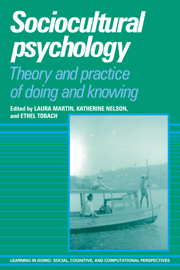Book contents
- Frontmatter
- Contents
- Series foreword
- Preface
- Contributors
- 1 Introduction
- Part I History and culture
- 2 Situated theory as a bridge between psychology, history, and educational practices
- 3 The uniqueness of human labor
- 4 Reflecting on Russian consciousness
- Part II Doing psychology
- Part IV Activity in work and school
- Index
3 - The uniqueness of human labor
Published online by Cambridge University Press: 05 November 2011
- Frontmatter
- Contents
- Series foreword
- Preface
- Contributors
- 1 Introduction
- Part I History and culture
- 2 Situated theory as a bridge between psychology, history, and educational practices
- 3 The uniqueness of human labor
- 4 Reflecting on Russian consciousness
- Part II Doing psychology
- Part IV Activity in work and school
- Index
Summary
In applying the concept of levels of integration to cognition, or mind, Scribner (1990) projected a sociohistorical analysis based on the work of Vygotsky as a clear explication of the significance of discontinuous categories such as mind in behavioral evolution. In describing the discontinuity of human cognition, she stressed its relationship with labor, a uniquely human characteristic. (Scribner, 1990, p. 109)
“A defining characteristic of … human cognition … is that humans do not interact directly with the environment (Vygotsky 1978, 1987). Rather, they regulate their interactions with each other and with the environment through systems of ‘objects’. These objects … ‘mediate’ human actions in the world. The classic case of human activity mediated by objects is labor, and Marx's (1936) description of the role of tools or instruments in this process served Vygotsky as a prototype of all human actions: ‘The elementary factors of the labour-process are (1) the personal activity of man, i.e., work itself, (2) the subject of that work, and (3) its instruments…. An instrument of labour is a thing, or a complex of things, which the labourer interposes between himself and the subject of his labour, and which serves as the conductor of his activity.’” (Vygotsky, in Wertsch, 1981, p. 174)
This presentation by Scribner in 1989 at the T. C. Schneirla Conference on “The Evolution of Knowing” (Scribner 1990) stimulated us to plan a conference in which approaches based on activity theory and on the concept of integrative levels would be used to elucidate the evolution of labor and its uniquely human character. That conference never came to be because of Sylvia Scribner's death.
- Type
- Chapter
- Information
- Sociocultural PsychologyTheory and Practice of Doing and Knowing, pp. 43 - 66Publisher: Cambridge University PressPrint publication year: 1995
- 5
- Cited by



